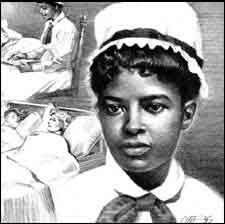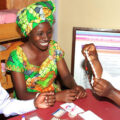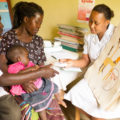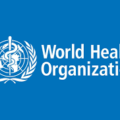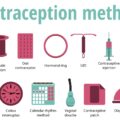The first population intervention trial was conducted in the 1950s, in the form of a clinical trial with an intervention area and a control area, in the Punjab province of India. India was the first country to officially adopt a family planning program in 1952. Following this trial, many family planning programs were implemented in most Third World countries including Nigeria
Third World fertility decline began most often after 1960 and is mainly the result of public policies, that is family planning programs. According to United Nations estimates, fertility in Asia fell from 5.67 to 2.24 children per woman between 1960 and 2010 and in Latin America from 5.95 to 2.20 children per woman during the same period, thus realizing the essential part of the transition of fertility in half a century. In sub-Saharan Africa as a whole, fertility declined only slightly during the same period of time, from 6.62 to 5.26 children per woman between 1960 and 2010. Africa is the last continent where the transition was delayed and remained largely unfinished by 2010. Nigeria is the most densely populated country in Africa, with approximately 200 million representing 2.64% of the total world population. This means that about 1 out of every 43 people in the world call Nigeria their home.
The history of family planning in Nigeria is different and has been marked by several major handicaps: lack of political commitment and recurrent political instability; on social grounds, strong resistance from traditional and religious authorities, especially Muslims in the north and Catholics in the south, as well as sexual taboos, rumors and frontal opposition to certain methods of contraception from selected groups; at the organizational level, poor organization and mismanagement of the program, and in particular low reliance on community activities.
However, family planning in Nigeria started early, in 1962, with the creation of an association (Family Planning Council of Nigeria). As in Ghana, but later, a population policy was adopted in 1989 (National Population Policy for Development, Unity, Progress, and Self-Reliance), followed by an awareness campaign (1992), but they were not successful and did not have an impact as in Ghana, although an ambitious goal of four children per woman has been recently adopted. The family planning program was reactivated in 2004, then in 2012, but so far had only modest effects in rural areas. As a result, the 2010 indicators differ widely between the two countries: rural Ghana achieved already almost half of its transition (43.3%), while rural Nigeria is still in its early stage (13.0%).
In Ghana, all indicators are better: the program effort index, the prevalence of modern contraception, and home visits. In Ghana, rural fertility declined steadily since 1980, while in Nigeria it has been irregular, fluctuating, and declining only since 2002. In addition, it should be noted that demographic data in Nigeria are problematic, while they are of much better quality in Ghana.
In Nigeria, fewer than one out of every five married women use family planning. An additional 16 percent of women want to delay or limit childbearing but are not using contraception. Limited access to family planning prevents women from safely spacing their pregnancies, fuels unsustainable population growth, and puts the health of women and children at risk.
While the Nigerian Government provides contraceptives and other family planning commodities at no cost, state governments are responsible for getting the products to the clinics, pharmacies, and other health facilities where women can access them. Many states, however, have not dedicated funds to transport the contraceptives to local health facilities, threatening breaks in contraceptive protection for millions of women.
The Nine Standards to uphold the human right to family planning
- Non-discrimination
Family planning information and services cannot be restricted on the basis of race, sex, language, religion, political affiliation, national origin, age, economic status, place of residence, disability status, marital status, sexual orientation, or gender identity.
- Available
Contraceptive information and services must be available in sufficient quantity, with sufficient variety, to accommodate everyone in need. This is a human right necessity, just like access to clean drinking water, adequate sanitation, and a minimum standard of health care. Of course, there are many underlying factors that affect the availability of contraceptive information and services, such as the quality of the education system and health infrastructure. Still, these issues must be addressed as a matter of human rights.
- Accessible
Countries must ensure that family planning commodities and services are accessible to everyone. This means services and information must be physically accessible, as well as affordable.
- Acceptable
Contraceptive services and information must be provided in a dignified manner, respecting both modern medical ethics and the cultures of those being accommodated.
- Good quality
Family planning information must be clearly communicated and scientifically accurate. Contraceptive commodities must be unexpired, and contraceptive services must be provided by skilled health personnel in a safe, sanitary environment.
- Informed decision-making
Every person must be empowered to make reproductive choices with full autonomy, free of pressure, coercion, or misrepresentation. Comprehensive contraceptive counselling must equip people with a full understanding of their choices, and they must be free to refuse any and all options.
- Privacy and confidentiality
All individuals must enjoy the right to privacy when seeking family planning information and services. Health workers must be trained to uphold the confidentiality of all people exercising their right to family planning.
- Participation
Countries have an obligation to ensure the active and informed participation of individuals in decisions that affect them, including health issues. This means, for instance, that women – who are often the primary recipients of family planning services – must be represented in the development of policies related to these services. Young people must be included in efforts to promote education about sexual and reproductive health, including family planning. The perspectives of the vulnerable and marginalized must be incorporated into the provision of services in their communities.
- Accountability
Health systems, education systems, leaders, and policymakers must be accountable to the people they serve in all efforts to realize the human right to family planning. This means women, young people, and marginalized populations must be aware of their rights, and must be empowered to seek redress if this right is violated. SEE: Types of Family Planning Methods In Nigeria

